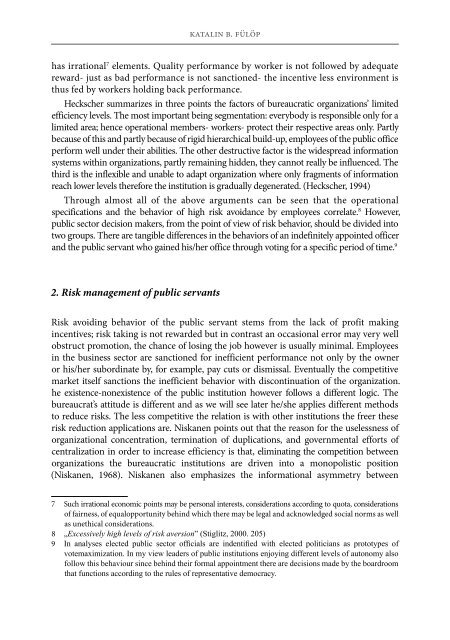ACTA SZEKSZARDIENSIUM - Pécsi Tudományegyetem Illyés Gyula ...
ACTA SZEKSZARDIENSIUM - Pécsi Tudományegyetem Illyés Gyula ...
ACTA SZEKSZARDIENSIUM - Pécsi Tudományegyetem Illyés Gyula ...
Create successful ePaper yourself
Turn your PDF publications into a flip-book with our unique Google optimized e-Paper software.
katalin b. fülöp<br />
has irrational 7 elements. Quality performance by worker is not followed by adequate<br />
reward- just as bad performance is not sanctioned- the incentive less environment is<br />
thus fed by workers holding back performance.<br />
Heckscher summarizes in three points the factors of bureaucratic organizations’ limited<br />
efficiency levels. The most important being segmentation: everybody is responsible only for a<br />
limited area; hence operational members- workers- protect their respective areas only. Partly<br />
because of this and partly because of rigid hierarchical build-up, employees of the public office<br />
perform well under their abilities. The other destructive factor is the widespread information<br />
systems within organizations, partly remaining hidden, they cannot really be influenced. The<br />
third is the inflexible and unable to adapt organization where only fragments of information<br />
reach lower levels therefore the institution is gradually degenerated. (Heckscher, 1994)<br />
Through almost all of the above arguments can be seen that the operational<br />
specifications and the behavior of high risk avoidance by employees correlate. 8 However,<br />
public sector decision makers, from the point of view of risk behavior, should be divided into<br />
two groups. There are tangible differences in the behaviors of an indefinitely appointed officer<br />
and the public servant who gained his/her office through voting for a specific period of time. 9<br />
2. Risk management of public servants<br />
Risk avoiding behavior of the public servant stems from the lack of profit making<br />
incentives; risk taking is not rewarded but in contrast an occasional error may very well<br />
obstruct promotion, the chance of losing the job however is usually minimal. Employees<br />
in the business sector are sanctioned for inefficient performance not only by the owner<br />
or his/her subordinate by, for example, pay cuts or dismissal. Eventually the competitive<br />
market itself sanctions the inefficient behavior with discontinuation of the organization.<br />
he existence-nonexistence of the public institution however follows a different logic. The<br />
bureaucrat’s attitude is different and as we will see later he/she applies different methods<br />
to reduce risks. The less competitive the relation is with other institutions the freer these<br />
risk reduction applications are. Niskanen points out that the reason for the uselessness of<br />
organizational concentration, termination of duplications, and governmental efforts of<br />
centralization in order to increase efficiency is that, eliminating the competition between<br />
organizations the bureaucratic institutions are driven into a monopolistic position<br />
(Niskanen, 1968). Niskanen also emphasizes the informational asymmetry between<br />
7 Such irrational economic points may be personal interests, considerations according to quota, considerations<br />
of fairness, of equalopportunity behind which there may be legal and acknowledged social norms as well<br />
as unethical considerations.<br />
8 „Excessively high levels of risk aversion” (Stiglitz, 2000. 205)<br />
9 In analyses elected public sector officials are indentified with elected politicians as prototypes of<br />
votemaximization. In my view leaders of public institutions enjoying different levels of autonomy also<br />
follow this behaviour since behind their formal appointment there are decisions made by the boardroom<br />
that functions according to the rules of representative democracy.<br />
18




